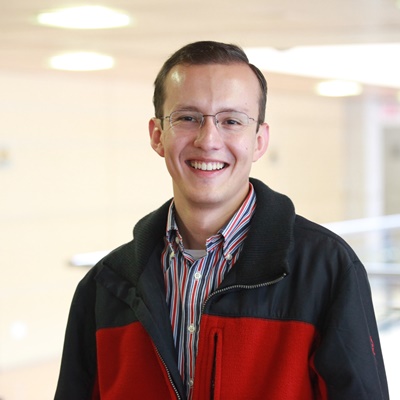Grupo COMIT
Categoría Colciencias: A1
Desde su creación en 2002, ha buscado plantear soluciones de integración e intercambio de información en ambientes heterogéneos y distribuidos con el fin de resolver las problemáticas planteadas por las nuevas tecnologías, generar conocimiento y aprovechar oportunidades brindadas por tecnología informática de punta. Actualmente aborda temáticas relacionadas con la seguridad informática, las infraestructuras en la nube, el análisis de información estructurada y no estructurada, las infraestructuras altamente escalables, la gestión de conocimiento y las infraestructuras móviles, entre otras.
La fortaleza de COMIT es la diversidad complementaria, en tecnologías de información de punta, para lograr soluciones a problemas complejos. Esto se ve reflejado en algunos cursos obligatorios y electivos de los programas de pregrado y maestría.
Para conocer más sobre el Grupo de Comunicaciones y Tecnologías de Información COMIT visite el sitio web AQUÍ
Profesores
Buscar:
-

Harold Enrique Castro Barrera
Profesor titular
Harold Enrique Castro Barrera
 Oficina: ML 428
Oficina: ML 428
 Correo: hcastro@uniandes.edu.co
Correo: hcastro@uniandes.edu.co
 Extensión:2868
Extensión:2868
COMIT-Comunicaciones y Tecnología de Información Grupo::
Grupo:: -

Yezid Enrique Donoso Meisel
Profesor titular
Yezid Enrique Donoso Meisel
 Oficina: ML 773
Oficina: ML 773
 Correo: ydonoso@uniandes.edu.co
Correo: ydonoso@uniandes.edu.co
 Extensión:1723
Extensión:1723
COMIT-Comunicaciones y Tecnología de Información Grupo::
Grupo:: -

Juan Diego Jiménez
Profesor
Juan Diego Jiménez
 Oficina: ML 605
Oficina: ML 605
 Correo: jujimene@uniandes.edu.co
Correo: jujimene@uniandes.edu.co
 Extensión:3893
Extensión:3893
COMIT-Comunicaciones y Tecnología de Información Grupo::
Grupo:: -

Haydemar María Nuñez Castro
Profesional Distinguido
Haydemar María Nuñez Castro
 Oficina: ML 639
Oficina: ML 639
 Correo: h.nunez@uniandes.edu.co
Correo: h.nunez@uniandes.edu.co
 Extensión:2893
Extensión:2893
COMIT-Comunicaciones y Tecnología de Información Grupo::
Grupo:: -

Jesse Padilla Agudelo
Profesor de cátedra
Jesse Padilla Agudelo
 Oficina: ML 761
Oficina: ML 761
 Correo: pa.jesse10@uniandes.edu.co
Correo: pa.jesse10@uniandes.edu.co
 Extensión:1890
Extensión:1890
COMIT-Comunicaciones y Tecnología de Información Grupo::
Grupo:: -

Sandra Julieta Rueda Rodríguez
Profesor asociado
Sandra Julieta Rueda Rodríguez
 Oficina: ML-772
Oficina: ML-772
 Correo: sarueda@uniandes.edu.co
Correo: sarueda@uniandes.edu.co
 Extensión:2857
Extensión:2857
COMIT-Comunicaciones y Tecnología de Información Grupo::
Grupo:: -

María del Pilar Villamil Giraldo
Profesor asociado
María del Pilar Villamil Giraldo
 Oficina: ML 631
Oficina: ML 631
 Correo: mavillam@uniandes.edu.co
Correo: mavillam@uniandes.edu.co
 Extensión:2856
Extensión:2856
COMIT-Comunicaciones y Tecnología de Información Grupo::
Grupo:: -

Mario Villamizar Cano
Profesor de cátedra
Mario Villamizar Cano
 Oficina:
Oficina:
 Correo:
Correo:
 Extensión:
Extensión:
COMIT-Comunicaciones y Tecnología de Información Grupo::
Grupo::
Ejemplos de instituciones con las que ha colaborado
Empresas del sector privado
Oracle
Tigo
Huawei
IBM
Cisco
Microsoft
VMWare
POSITIVA
Empresas del sector público
RENATA
Ministerio de Defensa
Ministerio de las TIC
Fondo de Prevención Vial
Servicio geológico colombiano
Consejo Colombiano de Seguridad
Universidades e Instituciones Académicas
University of Southern California
INPG
Sophia Antipolis
INRIA
Universidad de Girona
LIG
Université de Grenoble
Laboratoire d'Informatique, de Modélisation et d'Optimisation des Systemes
Apply Now for Computational and Data Science Fellowships and George Michael Memorial Fellowships
ACM SIGHPC/Intel Computational and Data Science Fellowships
If you are a graduate student in data science and computational science, you are encouraged to apply for the ACM SIGHPC/Intel Computational and Data Science Fellowships, an international program of graduate fellowships created by SIGHPC, ACM's Special Interest Group on High Performance Computing, and Intel. The ACM Fellowships aim to increase diversity in these fields.
To qualify, you must be either currently enrolled in a graduate program or accepted to begin in one no later than October 15 of this year; pursuing a graduate degree (Master's, PhD, or equivalent) in computational or data science; be less than halfway through her/his planned program of study; and a be woman and/or a member of a racial/ethnic group that is currently underrepresented in the computing field in the country where you will earn the degree.
The deadline for applications is April 30. Each fellowship recipient will receive a stipend prior to the start of their first academic term after August 1, and will be recognized formally at the annual SC conference awards presentation in November.
ACM-IEEE-CS George Michael Memorial HPC Fellowships
The ACM-IEEE-CS George Michael Memorial HPC Fellowships honor exceptional PhD students throughout the world whose research focus is on high performance computing applications, networking, storage, or large-scale data analysis using the most powerful computers that are currently available. The awards are presented each November at the annual SC Conference, where the recipients are recognized at the SC Awards Ceremony. Each fellowship is accompanied by an honorarium of $5,000 plus travel expenses to attend the conference.
Candidates must be enrolled in a full-time PhD program at an accredited college or university and must meet the minimum scholastic requirements at their institution. They are expected to have completed at least one year of study, and have at least one year remaining between the application deadline and their expected graduation.
Nominations are due May 1.
Tesis doctoral en conjunto con la U. de Nice, en Francia.
Preserving privacy in deep learning networks
In recent years, we have witnessed an explosion of successful applications of deep learning, including object extraction, speech recognition, machine translation, car driving, recommendation systems, etc. In many applications of machine learning, such as machine learning for medical diagnosis, we would like to have machine learning algorithms that do not memorize sensitive information about the training set, such as the specific medical histories of individual patients.
Machine learning algorithms work by studying a lot of data and updating their parameters to encode the relationships in that data. Ideally, we would like the parameters of these machine learning models to encode general patterns rather than specific facts about specific training examples. Unfortunately, machine learning algorithms do not learn to ignore these specifics by default. If we want to use machine learning to solve an important task, like making a cancer diagnosis model, then when we publish that machine learning model, we might also inadvertently reveal information about the training set. A malicious attacker might be able to inspect the published model and learn private information.
Scientists have proposed many approaches to provide privacy when analyzing data. For instance, it is popular to anonymize the data before it is analyzed, by removing private details or replacing them with random values. Common examples of details often anonymized include phone numbers and zip codes. However, anonymizing data is not always sufficient and the privacy it provides quickly degrades as adversaries obtain auxiliary information about the individuals represented in the dataset.
Centrally kept data is subject to legal subpoenas and extra-judicial surveillance. Many personal data - for example, medical institutions that may want to apply deep learning methods to clinical records - are prevented, for reasons of privacy and confidentiality, from sharing data and thus benefiting from large-scale deep learning.
The objective of this thesis is to design, implement and evaluate a practical system that allows several parties to jointly learn a specific neural network model for a given purpose without sharing their input data. This is to exploit the fact that the optimization algorithms used in modern deep learning, namely those based on stochastic gradient descent, can be paralleled and executed asynchronously. One of the objectives would be for each participant to train independently on his or her own data set while selectively sharing with other participants a subset of the key parameters of his or her model. Each participant thus preserves the confidentiality of his data while taking advantage of the models of the other participants, which allows him to improve the accuracy of learning beyond what is only possible with his own data.
For example, one could imagine that a network of doctors or hospitals could exchange parts of the model in this way rather than building a single global system hosting all the data.
This project is obviously carried out in collaboration with the medical teams of the University Hospital and in particular with the Department of Medical Informatics (DIM) headed by Professor Pascal STACCINI.
This thesis is part of the IDB project funded by IDEX UCA IDEX. Anonymous data are available representing 10 years of EHRs for care and resuscitation suites (PMSI SSR) and for medicine, surgery and obstetrics (PMSI MCO).
Posición de investigador de tiempo completo en la Universidad de Passau
This is a full-time position initially for one year with the option of renewal.
Your responsibilities
- Collaboration on the H2020 project SEMIOTICS (semiotics-project.eu) funded by the European Commission
- Elaboration of current IT-Security topics: particularly in the following areas:
- Extension of existing open source projects related to authentication, identity management, and access control (NodeJs, python, among other languages)
- Monitoring of computational resources, such as processing, storage, and networking in Kubernetes framework, or OpenStack, depending on the project’s decision.
- Prediction of threats to availability for components developed by the consortium, based on results from monitoring or resources. In this regard, a machine learning background would be highly appreciated. pintas
- Refine an existing threat analysis on particular use cases to apply security mechanisms, as security functionality becomes available.
- Implement demonstrations for the security components developed within the project by our University.
- Although the previous aspects are the focus of the role, the candidate would likely contribute to security-related aspects of Software Defined Networks (SDN).
- Likewise, the implementation of prediction algorithms in embedded devices with limited memory and processing capacity could be needed.
- Assistance on the conception and elaboration of new research projects on IT-Securit
- Opportunity of doctoral research
Personal requirements
- Excellent university degree (M.Sc. or comparable) in Informatics or related field
- Experience with IT-Security (esp. applied cryptography) and Cloud Computing
- Willingness to cooperate with national and international researchers (incl. traveling)
- Very good English skills, both written and spoken
- Teamwork skills, openness, flexibility and the ability to work independently
What we offer
- Remuneration in accordance with pay grade E13 of the German public-sector collective agreement TV-L, salary level dependent on qualifications and experience
- A rewarding, diverse and challenging academic position on a modern, verdant campus located on the banks of the river Inn, a few minutes' walk from Passau’s historic Old Town
- A great work climate in a family-friendly environment
- Very good English skills, both written and spoken
- The opportunity to contribute to open source solutions on the IT security field.
The University of Passau wishes to increase the proportion of its female staff and expressly encourages women to apply for the position. This position is suitable for candidates with disabilities. Disabled persons will be given preference if the personal aptitudes and qualifications are equal.
If you have any further questions about this position, please contact Dr. Joachim Posegga by e-mail (jp@sec.uni-passau.de) or by telephone +49-851-509-3211.
To apply, please send your full application (including school, training and work certificates) in only one file in the pdf format to itsec-office@uni-passau.de. Once the application process has been completed, we will retain your application on file for five months before deleting it from our computer systems.








